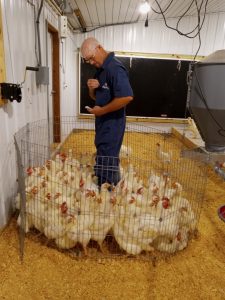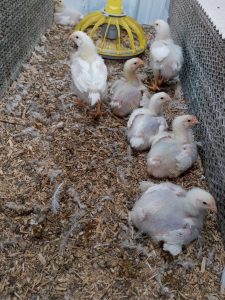By: Dr. Oscar Tejeda, M.Sc., Ph.D.
Assistant Professor of Poultry Science, SAU Department of Agriculture
Introduction
Biosecurity refers to the series of processes taken to prevent the introduction and spread of diseases into the farm. Biosecurity includes the group of visible (structural biosecurity) and invisible (operational biosecurity) procedures done at the farm that serve as barriers against the dissemination of diseases. In general terms, biosecurity is considered the cheapest way to control diseases, since some diseases are highly contagious and mortal for poultry. Within a farm, biosecurity is a team effort and everyone working at the farm must be familiar with the procedures to be followed. Biosecurity is as strong as its consistency, meaning that as long as individuals at the farm are being consistent in applying the principles, biosecurity in the farm is strong, yet, when one of the procedures of biosecurity is ignored, biosecurity as a whole and the health of the flock are at risk. Therefore, biosecurity must be part of the farmer’s budget, this is because it is easier to prevent a disease than to control a disease.
Vectors of diseases
Poultry diseases are generally transmitted through different vectors. People, animals, equipment, tools, feed, and vehicles are very common way of disease transmission. A vector is any living organism that carries and transmit infectious pathogens associated with a disease. The most common vectors in poultry farms are:
- human workers
- rats and mice
- wild birds
- insects
- pets (dogs and cats)
- wild animals
Most diseases are caused by microorganisms such as bacteria, viruses, and protozoa which are invisible to the human eye and can only be seen using microscopes. These microorganisms are the primary source of diseases in poultry, and generally, have the aforementioned vectors as hosts. In other cases, such as fowl mites, vectors can directly affect the birds by sucking blood (causing anemia) and also can transmit microorganisms through the bird’s bloodstream, resulting in diseases (due to the weakened immune system of the anemic birds).
Biosecurity code for farm workers

All individuals considered farm workers must practice and be familiar with all the biosecurity principles being used at the farm. It is recommended that farm workers have access to clothing and shoes dedicated for working at the farm only. When the farm is divided in several sections (i.e. houses/barns) each section of the farm should have their own equipment and sharing of equipment should be avoided as much as possible.
Farm equipment and subdivisions
If a piece of equipment needs to be used in another section of the farm, it must be properly clean and disinfected before its use. If the farm installations allow it, it is highly recommended to shower in and shower out to prevent the introduction and dissemination of diseases. In hatchery installations the shower in and shower out is a must and needs to be practiced by all employees. Clothes must be washed daily using disinfecting soaps.
Farm workers working in different sections of the farm should either shower in/out or change clothes every time they visit different section of the farm. Growers should not have contact with other poultry or avian species (i.e. parrots, ducks) and when they do, ideally, an adequate period of quarantine must be taken to prevent the dissemination of diseases. If not possible, adequate washers should be taken before entering the farm.
When visiting other farms
Growers should limit visits to other farms unless absolutely necessary. Growers that have visited other farms should shower, change clothes and make sure that tires of vehicles used to visit the other farm are disinfected before entrance. It is important to keep a log of activities conducted out of the farm and locations visited to be able to track the possible spread of diseases.
Farm visitors
Whenever possible, visitors must be kept to a minimum, especially if such visitors have contact with other avian or poultry species. Ideally, only farm workers should have access to the farm installations. When visitors (people other than farm workers) visit the farm, extra biosecurity procedures must be practiced. These procedures include wearing hair nets, disinfect hands, use clean coveralls, use boot covers, and if possible shower in and shower out. It is very important to always keep track of anyone who has visited the farm installations and ensure that a visitor’s log is filled to back track any problem. Visitors should never enter the farm installations without authorization of the farm manager. Growers are encouraged to post signs at the entrance of the farm including information about restricted entrance and contact information.
For visitors from other countries, it is important to be aware of potential endemic diseases from such countries and a quarantine based on such information is encouraged.
About the flock

It is important to conduct a daily detained inspection of the flock to monitor the general health and the potential onset of diseases. When the health of the flock seems to be in danger, growers must immediately report such issues to the field technician. In the case of farms with different houses, growers should start bird checks on the youngest flocks moving to the older flocks. Growers should check healthier houses first and the houses with higher mortality at the end.
Growers are required to pick up and dispose of mortality on a daily basis. This is an important activity that reduces the risk of spreading diseases all over the house and ultimately, the farm. Mortality must be composted and never stacked, otherwise, microorganisms will grow in numbers and the potential for disease increases.
Litter quality is important, especially litter moisture. Wet moisture increases microbial activity increasing the probability of infections and diseases. Therefore, the farm must be checked daily for water leaks, and the litter can be monitored for moisture by taking a small sample of litter and determining the moisture level. Adequate ventilation is a key factor in maintaining an adequate and secure litter moisture (22-28%).
General aspects about the farm
Grass and weeds
Most of the farms are located in semi-rural areas where weeds and grass grow extremely fast. Therefore, adequate equipment must be obtained to cut the grass and weeds and prevent rats, mice, and insects to live and reproduce in them.
Mice and rats
Mice and rats are one of the major concerns for growers, since they don’t only transmit diseases, but they also are highly destructive of cables, curtains, and any other thing at their reach. Therefore, it is important to maintain and adequate mice/rat pest control to prevent problems. It is also important to clean regularly spilled feed which attracts rats and mice.
Spilled feed
It is important to take care of any feed spilled since this will attract rats, mice, wild birds, hogs, deers, and any other animal with the desire to consume such feed. When using automatic feeding systems, it is important that the grower is constantly supervising during the feeding time. Remember that automatized farms depend on motors, augurs, controllers working properly for the system to be whole and when any part of the system is not working properly, there is feed being spilled and that can generate big losses and increase undesired vectors.
Recognizing diseases in the flock
Constant monitoring of the flock is paramount to ensure that adequate corrections are employed at the right time. Some signs that may indicate the presence of a disease in the flock include:
- loss of appetite
- loss of weight
- lethargic birds
- lower water consumption (can be checked in the water-meter)
- purple discoloration of combs, legs
- nasal discharge
- coughing, sneezing
- diarrhea
- higher mortality
- soft-shelled eggs
If any of these signs are occurring in your flock make sure you contact your field technician immediately.
